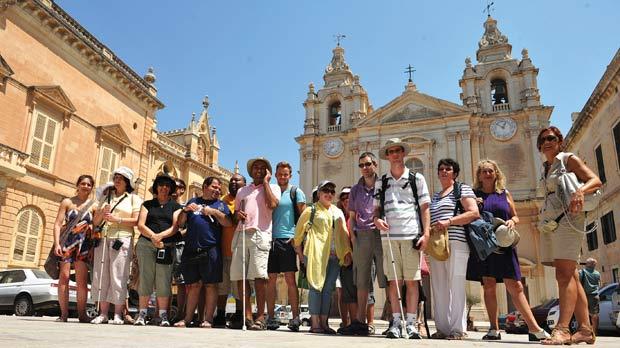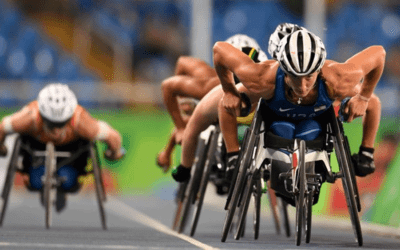
A group of blind travellers discover Mdina
Led through the winding streets of Mdina, aided by his white stick, a tourist exclaims it is “fantastic”. Through Amar Latif’s eyes, the Silent City is a sensory experience, which answers the obvious question on why the blind would want to sightsee.
The “amazing” weather, as opposed to the inconsistency of the UK climate, plays a major role in how he views Mdina and, though the heat is oppressive, the blind tour manager relaxes in its warmth and appreciates the still air stifling the sighted.
Mr Latif’s vision is channelled through other senses: he “feels the ambiance” of the Silent City. Fortunately, it is not so quiet, so he can enjoy it through its sounds. He is receptive to a horse-drawn carriage and not taken aback by its proximity. And when the bell tinkles, it does not fall on deaf ears. For Mr Latif, it has a particular ring to it.
The lack of cars is taken for granted by the sighted but for Mr Latif it is “peaceful”. He can sense the narrow streets, feel the palaces… “and their knockers”, he laughs. Like others, his impressions of the country are also based on interaction and communication with the locals.
Mr Latif is not alone on his Mdina tour. Apart from “my eyes”, Sam Thorpe, he is accompanying a 20-strong group of blind tourists from the US, the UK, Ireland and Portugal and their sighted guides on a week’s holiday in Malta.
Mr Latif is the founder and director of the “unique” tour operator Traveleyes, which organises trips for the blind – and sighted travellers. These are not just guides but on holiday in their own right. Most have never met each other or a blind person in their lives and the trips bring them together.
So who would choose to go on holiday with a group of blind travellers and why? “We have women, for example, who are either widowed or whose husbands do not want to accompany them abroad,” Mr Latif explains. Rather than travel alone, they choose to help others “see” the world while discovering it for themselves at half the price. However, he adds, money is not the main motivator.
Seasoned traveller Anne Durrant, from the UK, is a sighted guide. She wanted to go on holiday somewhere and meet new people, without having to think about anything or spend loads. “I thought I might be with a load of old codgers. I’m relieved I’m the only one…”. It is their first day but Mr Latif has already formed his impressions and says the Maltese are “genuinely friendly”. Although it would appear that he cannot distinguish between them, he is looking forward to “seeing” the capital and Gozo.
He first visited Malta when he was 16 and could still see. The 36-year-old lost his sight when aged 18, when he had just started University. At four, doctors said he would go blind by his mid-teens due to a hereditary condition but when he lost his sight two months into his mathematics course, he recalls nothing could have prepared him for it.
 “Suddenly, I could not read my textbooks. Like other students, I was so enthusiastic about going through my reading list!” Societies for the blind had no experience of recording mathematics on tape, so it was complicated. “But we created our own systems,” he says, going on to be “a blind accountant” for a major company.
“Suddenly, I could not read my textbooks. Like other students, I was so enthusiastic about going through my reading list!” Societies for the blind had no experience of recording mathematics on tape, so it was complicated. “But we created our own systems,” he says, going on to be “a blind accountant” for a major company.
Mr Latif continued to successfully climb the career ladder and decided to set up Traveleyes when his love for travel was constantly hitting obstacles. “Tour operators were not accessible to the blind, saying I had to be accompanied. But taking a friend meant compromise for both and I wanted to travel where, how and when I wanted.” He now travels about 30 times a year.
With Traveleyes, partners are changed everyday. “Tomorrow is free, for example, so it is for me to organise who wants to go to Valletta or to the beach. Like that, everyone does what they prefer and everyone meets everyone.” Mr Latif hopes the Maltese blind can “join in the fun”. They can choose their destination fromwww.traveleyes–international.com and opt for the price from Luqa airport or just the land leg.
No one looks lost and confused in what would seem to be a dark world and everyone practically looks you in the eye, leaving the sighted person more bewildered than the blind. Guiding Mr Latif during the interview/walkabout is simple: lightly brush bent arms against each other, without the expected hard and fast grip. As the guide moves, the blind move too, with ease and comfort. The only downside would be the sweat in the 33°C, midday heat, which trickles through the contact. But Mr Latif makes a joke of that too.
Feeling ahead of the game, you may take the initiative to inform him there is a step further on, thinking you are doing a great job. But Mr Latif will say you are just about doing OK. “It would help if you said whether it was up or down,” he later jokes.
On exiting Mdina, it is a case of the blind leading the “blind”. It is Mr Latif who locates the rest of the group he has strayed from: “Are we out of the gate? Then turn left and there should be a red minivan,” he directs his own guide, who is more lost than he is…
The ground arrangements for the trip were made by Sunspot Malta.
Source: timesofmalta.com
Compartilhe
Use os ícones flutuantes na borda lateral esquerda desta página
Siga-nos!
Envolva-se em nosso conteúdo, seus comentários são bem-vindos!
Artigos relacionados
Acessibilidade no ESG. Equipotel aborda o tema para o turismo.
Acessibilidade no ESG, para o mercado do turismo. Equipotel aborda a importância da inclusão da pessoa com deficiência.
Morte Sobre Rodas. Filme inclusivo foi candidato ao Oscar.
Morte Sobre Rodas. Dois protagonistas do filme, são pessoas com deficiência, um usuário de cadeira de rodas e outro com paralisia cerebral.
Paralimpíada de Paris 2024. A deficiência não é um limite.
Paralimpíada de Paris 2024. A cidade luz sedia o maior evento esportivo do mundo para as pessoas com deficiência.






0 comentários